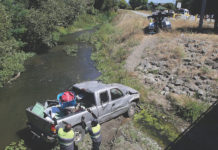MEXICO CITY — The wiggling fingers of a young girl trapped in the rubble of her collapsed school in Mexico City raised hopes among hundreds of rescuers working furiously Wednesday to try to free her — a drama that played out at dozens of buildings toppled by the powerful earthquake that killed at least 223 people.
But it was the ongoing rescue at the Enrique Rebsamen school, where 25 people including 21 children perished, that was seen as emblematic of Mexicans’ rush to save survivors before time runs out.
Helmeted workers spotted the girl buried in the debris early Wednesday and shouted to her to move her hand if she could hear. She did, and a rescue dog was sent inside to confirm she was alive.
Hours later the crews were still laboring to free her, as images of the rescue effort were broadcast on TV screens nationwide. Workers in neon vests and helmets used ropes, pry-bars and other tools, frequently calling on the anxious parents and others gathered around to be silent while they listened for any other voices from beneath the school.
At one point, the workers lowered a sensitive microphone inside the rubble to scan for any noise or movement. A rescuer said they thought they had located someone, but it wasn’t clear who.
“It would appear they are continuing to find children,” said Carlos Licona, a burly sledge-hammer wielding volunteer who came to help in any way he could. Asked if that made him optimistic, he said, “I hope so.”
It was part of similar efforts at the scenes of dozens of collapsed buildings, where firefighters, police, soldiers and civilians wore themselves out hammering, shoveling, pushing and pulling debris aside to try to reach the living and the dead.
By mid-afternoon, 52 people had been pulled out alive since Tuesday’s magnitude 7.1 quake, Mexico City’s Social Development Department said, adding in a tweet: “We won’t stop.” Among them were 11 people rescued at the Enrique Rebsamen school, where three people remained missing, two children and an adult. Earlier, journalists saw rescuers pull two small bodies from the rubble, covered in sheets.
More than 24 hours after the collapse, the debris being removed from the school began to change as crews worked their way inside: From huge chunks of brick and concrete, to pieces of wood that looked like remnants of desks and paneling, to a final load that contained a half-dozen sparkly hula-hoops.
Volunteer rescue worker Dr. Pedro Serrano managed to crawl into the crevices of the tottering pile of rubble and make it to a classroom, where he found no survivors.
“We saw some chairs and wooden tables. The next thing we saw was a leg, and then we started to move rubble and we found a girl and two adults — a woman and a man,” he said. All were dead.
“We can hear small noises, but we don’t know if they’re coming from … the walls above, or someone below calling for help,” Serrano said.
A helicopter overflight of some of the worst-hit buildings revealed the extent of the damage wrought by the quake: Three mid-rise apartment buildings on the same street pancaked and toppled in one Mexico City neighborhood; a block in the town of Jojutla, in Morelos state, where nearly every home was flattened or severely damaged and a ruined church where 12 people died inside.
The death toll included 93 people killed in Mexico City; 69 in Morelos state just south of the capital; 43 in Puebla state to the southeast, where the quake was centered; 12 in Mexico State, which borders Mexico City on three sides; four in Guerrero state; and one in Oaxaca, according to the official Twitter feed of civil defense agency head Luis Felipe Puente.
President Enrique Pena Nieto declared three days of national mourning even as authorities made rescuing the trapped and treating the wounded their priority. “Every minute counts to save lives,” Pena Nieto tweeted.
In the town of Jojutla in Morelos state, dozens of buildings collapsed, including the town hall. One building had been rocked off its foundations and part way into a river.
The town’s Instituto Morelos secondary school partl y collapsed, but an earthquake drill held Tuesday morning to mark the anniversary of an 8.0 earthquake that killed thousands in 1985 proved fortuitous, the school’s director, Adelina Anzures said.
“I told them that it was not a game, that we should be prepared,” Anzures said of the drill. When the quake hit, she said, children and teachers rapidly filed out and nobody was hurt.
Town residents who had spent Tuesday night on the streets next to homes that were severely damaged or flattened outright, wrapped in blankets or on mattresses, walked past shattered buildings and picked through what was left when daylight came
At a wake for Daniel Novoa, a toddler killed when his home collapsed, family members bent over a white child-size coffin surrounded by a crucifix and images of Mexico’s patron, the Virgin of Guadalupe. Alongside was a larger open coffin for the child’s aunt, Marta Cruz.
In Atzala in Puebla state, villagers mourned 11 family members who died inside a church when it crumbled during a baptism for a 2-year-old girl. People at the wake said the only ones to survive were the baby’s father, the priest and the priest’s assistant.
Power was being restored in some Mexico City neighborhoods that had been left in darkness overnight, and officials reported that the sprawling Metro system was running at near-normal capacity. Mayor Miguel Angel Mancera said there were 38 collapsed buildings in the capital alone, down from the 44 he had announced previously.
People rallied to help their neighbors in a huge volunteer effort that included people from all walks of life in Mexico City, where social classes seldom mix. Doctors, dentists and lawyers stood alongside construction workers and street sweepers, handing buckets of debris or chunks of concrete hand-to-hand down the line.
Even Mexico City’s normally raucous motorcycle clubs swung into action, using motorcades to open lanes for emergency vehicles on avenues crammed with cars largely immobilized by street closures and malfunctioning stoplights.
Economist Alfredo Coutino, Latin America director for Moody’s Analytics warned Wednesday of economic disruption to several central states and the capital in particular.
“Though it is too early for authorities to have an estimate of the damage as rescue work continues, it is certain that economic activity … will continue to be disrupted for some time,” Coutino wrote.








